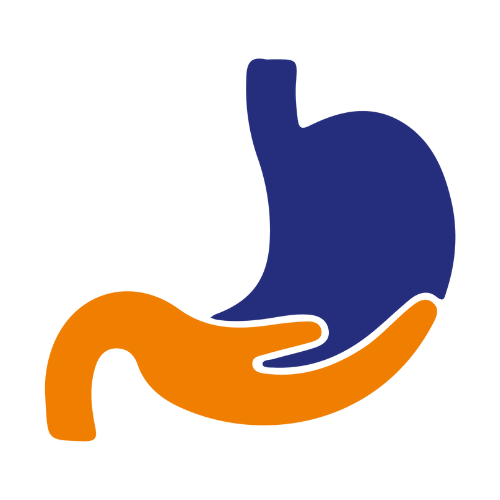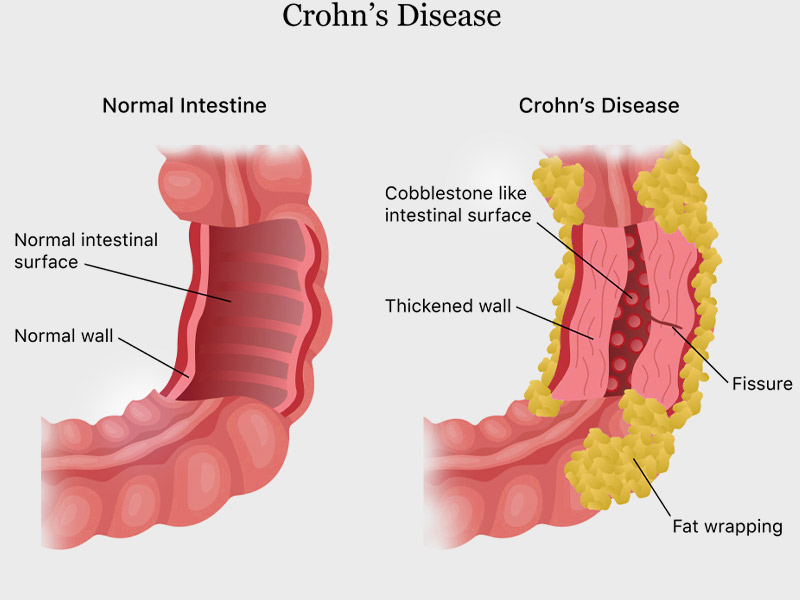Crohn’s Disease
Crohn’s disease a type of chronic Inflammatory Bowel Disease (IBD). It leads to inflammation of the digestive tract causing pain in the abdomen, tiredness, diarrhoea and weight loss. This disease commonly presents in the small intestine & the colon. However, it can occur in any part of the gastrointestinal tract, right from the mouth till the anus.
What are the Symptoms?
Symptoms of Crohn’s disease tend to develop slowly & can get worse over time. Early symptoms of the disease include:
- Cramps in the belly
- Diarrhoea
- Bloody stools
- Weight loss
- Fever
- Tiredness
- Frequent need for bowel movements
As the disease progresses, symptoms can get worse & may include:
- Fistulas
- Ulcers
- Inflammation of joints
- Shortness of breath
What are the Causes?
Several factors, such as heredity and a malfunctioning immune system, likely play a role in its development.
- Immune system. It’s possible that a virus or bacterium may trigger Crohn’s disease; however, scientists have yet to identify such a trigger. When your immune system tries to fight off the invading microorganism, an abnormal immune response causes the immune system to attack the cells in the digestive tract, too.
- Heredity. Crohn’s is more common in people who have family members with the disease, so genes may play a role in making people more susceptible. However, most people with Crohn’s disease don’t have a family history of the disease.
How is it Diagnosed?
- Blood tests to detect inflammation & anaemia
- Stool test to check for blood in the gastrointestinal tract
- Endoscopy
- Colonoscopy
- CT Scan
- MRI
- Biopsy
What are the Risk Factor?
- Age: Although a person of any age may develop Crohn’s disease, it is more commonly found in young adults in the age group of 20 to 30.
- Family history: You’re at higher risk if you have a first-degree relative, such as a parent, sibling or child, with the disease. As many as 1 in 5 people with Crohn’s disease has a family member with the disease.
- Cigarette smoking: Cigarette smoking is the most important controllable risk factor for developing Crohn’s disease. Smoking also leads to more-severe disease and a greater risk of having surgery. If you smoke, it’s important to stop.
- Nonsteroidal anti-inflammatory medications: While they do not cause Crohn’s disease, they can lead to inflammation of the bowel that makes Crohn’s disease worse.
Crohn’s disease may lead to one or more of the following complications
- Bowel obstruction
- Ulcers
- Fistulas
- Anal Fissure
- Colon Cancer
- Malnutrition
How is it Treated?
Although there is no cure for Crohn’s disease, there are many treatment options available to manage the symptoms effectively. Some of the treatment methods include:
- Dietary Changes
- Medications
- Anti-diarrhoea medications
- Anti-inflammatory medications
- Antibiotics
- Immunomodulators
- Biologics
- Surgery: Research indicates that in about 75% of the patients surgery may be required at some point. Generally, surgery is not recommended unless other treatment methods fail. Surgical intervention may involve repairing damaged tissue, treating infections or removing damaged parts of the gastrointestinal tract.

